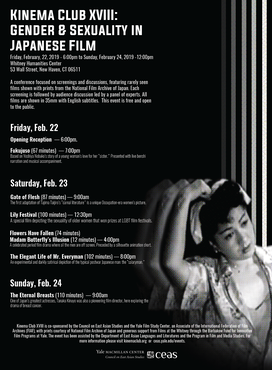
Our big Japanese film event at Yale this academic year is the Kinema Club conference, which is taking place February 22-24, 2019. As some of you know, Kinema Club has been around for over twenty years, serving as an informal network of those interested in Japanese film and media, including academics and non-academics. In the early years, it was primarily a means for exchanging information, but we soon took advantage of the internet and started a website at Ohio State University and began the KineJapan mailing list. We moved the website to Yale a few years ago (you can see it here), and last year moved the mail server for KineJapan to Yale as well. In the age of many other social media options, the old-fashioned mailing list is still very strong at KineJapan. You are welcome to subscribe here.
Although Kinema Club has no officers, no constitution, or membership fees, it has successfully put on conferences nearly every year in places ranging from Japan, the USA, Germany, Austria, and the UK. As a somewhat anarchistic organization, it has largely depended on a local institution or group of people to host the conference—and then everyone tries to go. Yale has hosted the event twice before: Kinema Club VII in 2006 (with Kurosawa Kiyoshi as a guest) and Kinema Club XII in 2013. Given Kinema Club’s anarchic nature, the formats of the conferences have varied, from full-fledged conferences with papers read to small workshops where the papers are distributed beforehand and participants only discuss them (that was what KC XII was like).
Kinema Club XVIII is yet again different in format, in that it will focus on screening and discussing rare films, not on delivering papers.
The format, inspired by the conferences held by the European Studies Council at Yale, centers on the screening of 35mm prints of rarely seen films obtained from the National Film Archive of Japan. After each film or set of films, a panel of 3-4 members will begin discussion not by reading prepared papers, but by each member offering comments strictly limited to 5-10 minutes. This leaves the majority of the time open for discussion among all the participants.
To help focus the discussion, the Yale organizing committee decided that the theme of KC XVIII will be “Gender and Sexuality in Japanese Cinema.” We held a rather unique call for papers that less called for papers than for film suggestions and volunteers for serving on panels.
The highlight of the conference will be the opening screening of Fukujuso, with benshi accompaniment by Kataoka Ichiro, and piano by Matsumura Makia. I wrote about last year’s screening of Fukujuso at Haremame last year (here is my write-up), which also featured Kataoka-san, but it will be interesting to see it again with different music.
Of the seven films (one is an animated short), the NFAJ did not have hard subtitled prints for two: Makino Masahiro’s Gate of Flesh (1948) and Tanaka Kinuyo’s The Eternal Breasts (1955). We were able to get a soft subtitles file from the BFI for Tanaka’s film, but the NFAJ’s print of Gate of Flesh had apparently only shown in Korea. So a dedicated group of Yale grad students are subtitling it in English, perhaps for the first time.
This underlines how rare these films are, especially to North American audiences, and thus how exciting this edition of Kinema Club should be. None of the films are available on DVD outside Japan—and a few are not even available on DVD in Japan. The choice of films cover different eras, and enable different approaches: there are women filmmakers, films only featuring women, films about models of masculinity, films about same-sex sexuality, etc. We have panelist from all around the world, as well as a few Yale colleagues from outside Japanese film studies offering their unique perspectives.
It should be a fun conference!
Below is the schedule, but you can also look up the event on the Council of East Asian Studies events page, on the Kinema Club page for the conference, and on the conference’s Facebook page (the latter should have updates).
SCHEDULE:
Dates: Friday, February 22, 2019 to Sunday, February 24, 2019
Venue: Whitney Humanities Center, Yale University, 53 Wall Street
City and State: New Haven, CT
All screenings and panel discussions are free and open to the public.
February 22, Friday
7:00pm - Fukujusō (Kawate Jirō, 1935) 『福寿草』(監督 川手二郎)
- With benshi by Kataoka Ichiro and live piano accompaniment by Makia Matsumura
- Panelists: Sarah Frederick, Marta Figlerowicz, Brian Meacham
February 23, Saturday
9:00 am - Gate of Flesh (Makino Masahiro, 1948)『肉体の門』(監督 マキノ正博)
- Panelists: Saitō Ayako, Kamiya Makiko, Vera Mackie, Griseldis Kirsch (Moderator: Irene Gonzalez)
11:30am - Lunch break
12:30pm - Lily Festival (Hamano Sachi, 2001)『百合祭』(監督 浜野佐知)
- Panelists: Jasper Sharp, Caitlin Casiello, Jonathan Hall
3:30pm - Coffee break
4:00pm - Flowers Have Fallen (Ishida Tamizō, 1938) 『花ちりぬ』(監督 石田民三) and Madam Butterfly’s Illusion (Arai Wagorō, 1940) 『蝶々夫人の幻想』(監督 荒井和五郎)
- Panelists: Katie Trumpener, Hsin-Yuan Peng, Jason Douglass
6:30pm - Dinner break
8:00pm - The Elegant Life of Mr. Everyman (Okamoto Kihachi, 1963)『江分利満氏の優雅な生活』(監督 岡本喜八)
- Panelists: Hannah Airess, Miryam Sas, Jennifer Coates, Xavier Sawada
February 24, Sunday
9:00am - The Eternal Breasts (Tanaka Kinuyo, 1955)『/乳房よ永遠なれ』(監督 田中絹代)
- Panelists: Alejandra Armendariz-Hernandez, Roger Macy, Irene Gonzalez, Earl Jackson

